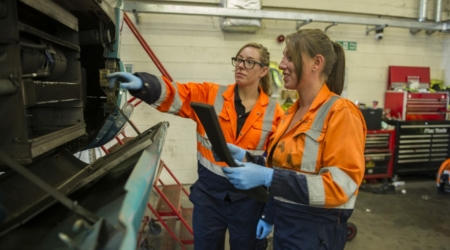Tech and industrial analysts believe that the optimization of the manufacturing process will result in the world’s fourth industrial revolution, dubbed as industry 4.0. Smart factories create a collaborative process in manufacturing, which is key to the revolution.
Automation is not a new concept in manufacturing. However, industry 4.0 reaches far beyond just automation of supply chains to advance manufacturing technologies into more flexible systems that collect and utilize data streams for machine learning and adaptation to production demands.
In this article, we’ll look at how they will influence the UK’s manufacturing scene in the future, and see why it’s essential for the UK to invest in smart factories.
How do these factories change the manufacturing business?
The factories of the future can influence business strategy and completely change how supply patterns fulfill the demands of the economy. The three major areas where artificial intelligence will affect manufacturing in the UK are on employment, business revenue and productivity.
Impact on employment
Contrary to popular belief about how artificial intelligence impacts the employment scene, the smart factories of industry 4.0 have the potential to generate jobs for the UK. According to Barclays, there will be potentially 101,000 new jobs over the next ten years as a result of shifting towards smart factory technologies. This is a projection done on clothing and textile industries, (contributing 12.6%), pharmaceuticals (8.5%), timber, paper and printing (7.0%), and fuels (6.8%).
These are some of the industries that would gain the most in the job sector.
Besides creating jobs, there will be an improvement in the quality of work that people will experience. About 35% of manufacturers already invested in smart factories claim that the systems allow the staff to focus on more highly skilled, better-paying work. While it’s possible that AI will replace some human jobs, the use of technology will enhance other jobs directly.
UK’s industrial heartlands would gain the most by investing in smart factories, for instance, in big data, sensors, machine learning, and energy self-generation. The North West, for example, would welcome over 13,000 more personnel, the Midlands (0ver 25,000) and Yorkshire and Humber (11,000), in a colossal employment hike.
Impact on Productivity
For the smart factory, it’s all about data. This means that they can create, collect, store, and manipulate high data volumes through cloud tech while being able to implement the necessary changes. By integrating data from different sources, such as sensors and robotics, a smart factory can improve its efficiency.
Machines can work better due to optimization and advanced automation. This integration will also include other manufacturing stages, for instance, design, planning, and logistics. Ultimately, there will be a seamless connection within the entire manufacturing supply chain that will enable real-time measurement, communication, and control across all stages. These features should boost the efficiency of the manufacturing process while increasing productivity and profits.
An example of the harmony in the manufacturing line that enhances productivity is the collaborative robot, also known as “the cobot.” This type of machine works alongside people and co-habits the workplace by helping people complete their tasks. Such cobots could work by holding or passing materials or tools in place. These will become more popular in the future smart factories, ranging in functionality.
Another business area we will see improvements in the future of manufacturing will be the reduction in defects and errors. As people will shift into higher skilled jobs, machines will operate in place of the homogeneous type labour, thus reducing the chances for mistakes.
Impact on Revenue
Smart factories will see an overall reduction in input costs. This is because manufacturing based on a demand data basis helps to reduce wastage. Also, the use of smart machines allows for more effective labour costs. Another reduced cost for manufacturing plants in the future will be maintenance costs. As tools can work at optimum conditions when need be and reduce their work rate depending on the demand data, this gradually reduces the occurrence of tear and wear.
Besides reducing the input use, a business will be able to increase its useful outputs. The inception of smart factories in the UK will increase factory efficiency as production planning efficiency increases. The safety in factories will also increase, as we will see fewer cases of accidents.
Why it’s vital for the UK to invest in smart factories
Through innovation and tapping of technology, factories in the future can enhance their productivity and improve their operations. UK companies will benefit from energy efficiency, their revenues, as well as the quality of work.
By accelerating the adoption and development of digital tech in the manufacturing industry, the UK will transform into a competitive environment in the sector.
Generally, consumers want better and cheaper products. Innovation will help in closing the gap between what consumers want and what manufacturers can produce.
Conclusion
One of the most attractive indicators of the smart factory in future manufacturing has to be increased productivity. Also, other benefits that manufacturers will gain from adopting smart factories include increased revenues and creating a better work value. The potential is immense, and thus, the UK should strive to get ahead of the competitors on this manufacturing front.









